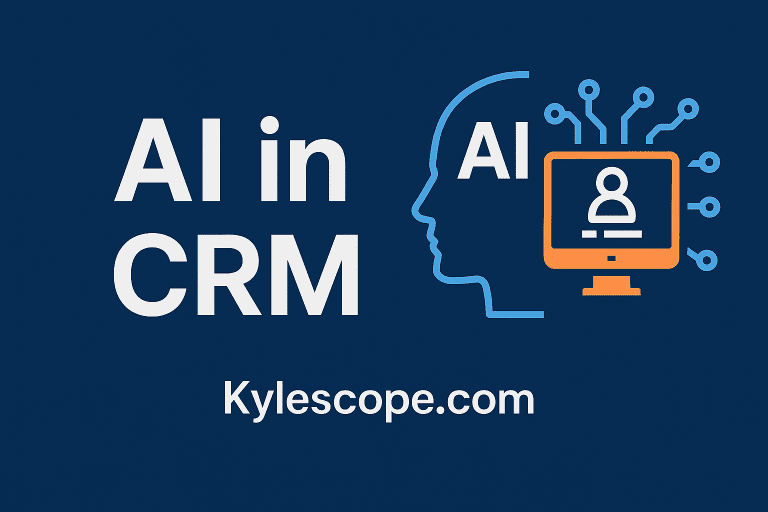Artificial intelligence is changing Customer Relationship Management (CRM) in unprecedented ways. It lays the foundation for businesses to access personalized, dynamic, and effective customer relationships. AI enables progressive data analytics, natural language processing, and machine learning to examine customer interactions, forecast customer needs, and automate repetitive tasks. Ultimately, these progressive features enable businesses to optimize customer engagement, cut down response times, and improve the quality of services rendered. AI-Powered CRM provides deep customer insights, which allows the relevant business stakeholders to make data-backed decisions while also enhancing customer satisfaction and loyalty.

Introduction
The competitive nature of business has seen businesses seeking the edge that helps them build stronger and lasting relationships with customers. Companies continue to acknowledge the roles played by CRM in administering customer interactions and instilling business growth. The traditional CRM has had significant limitations relating to manual processes and inflexible data analysis, which have had profound limitations. The main limitations include the inability to accommodate ever-changing customer expectations and market dynamics.
The entry of artificial intelligence into CRM has transformed business strategy by enabling businesses to exploit real-time data, artificial intelligence analytics and insights, and AI automation. These modern-day CRM technologies utilize large quantities of data, find patterns, and produce actionable insights for businesses to individualize customer interactions. These capabilities not only improve customer experiences profoundly but also enhance customer loyalty by creating trust and attending to customer needs.
AI-powered CRM
AI-Powered CRM empowers businesses to store and analyze relevant information to customize the sales process, streamlining sales and marketing tasks. Such technologies boost the workflows and help with the acquisition of customer insights. This section sheds more light on AI-Powered CRM.
AI in CRM integrates AI tools into Customer Relationship Management (CRM) to pave the way for data-backed customer interactions with businesses. Businesses utilizing AI and automation in CRM can use customer data progressively by acquiring deep insights into customer behavior, inclinations, and requirements. AI recognizes the role of customer engagement as the basis for strong customer relationship management.
AI in CRM Overview and Technologies
Historically, CRM systems consisted of databases containing customer information and interactions utilized by accountants. These systems integrated an increasing number of features and tools that became relevant for marketing, sales, and customer support. As time progressed, customer expectations and needs became sophisticated as businesses sought to retain customers for longer durations. As time progressed further, traditional data handling systems became redundant, requiring new information systems to be put in place. This is where artificial intelligence stepped into the scene and revolutionized Customer Relationship Management as known today. AI-powered CRM comprises numerous technologies including machine learning, natural language processing, predictive analytics, and chatbots (Virtual Assistants). The section below sheds light on all these technologies.
AI in CRM Machine Learning
AI-Powered CRM utilizes machine learning to process large data sets, find patterns, and consistently enhance decision-making abilities. The foundation of this form of CRM consists of numerous algorithms, such as supervised learning, unsupervised learning, and reinforcement learning. As such, machine learning enables AI-Powered systems to forecast customer behavior, refine marketing campaigns, and improve business strategies. Are you looking for an expert in machine learning to help with powering your CRM with AI? Such experts leverage their skills in technology to get you what you need.
AI in CRM Natural Language Processing
Natural language processing (NLP), on the other hand, comprises CRM technologies that enable comprehension, processing, and replies to textual and speech forms of human language. NLP empowers CRM with features such as sentiment analysis, language translation, and user intent identification. Additional AI features, such as the transformer-based model, enable CRM to determine user emotions, check feedback, and issue responses appropriate to different contexts. You can always find experts in natural language processing for your CRM by contacting one with the educational qualifications and industry-level experience.
AI in CRM Predictive Analytics
Predictive analytics utilizes historical data to establish prospective customer behaviors and tendencies. Predictive analytics empowers CRM to upsell and during customer acquisition. Moreover, AI analytics enables businesses or companies to make data-backed decisions and refine their resource distribution. You can also find experts in predictive analytics to help with your specific project here.
CRM Chat Bots
Chatbots refer to artificial intelligence tools that enable real-time and 24/7 customer support. These tools function with the help of machine learning and natural language processing to create human-like communication, solve problems, and process complex issues for relevant human agents. Chatbots or virtual assistants improve business strategy by reducing response time, operational costs, and improving customer satisfaction through refined customer service. Are you looking to install efficient chatbots or virtual assistants on your website? Look no further than here.
The Different Types of AI in CRM
AI in CRM comes in different forms, which convey specific solutions to help businesses. The following types of CRM are the most common:
Conversational AI
Conversational AI comprises chatbots and virtual assistants. They can understand and give contextual feedback when customers interact with it. These forms of CRM improve customer experiences and can gather relevant information when programmed appropriately.
Predictive AI
These are artificial intelligences used for forecasting, establishing trends, and finding leads. These tools help to optimize the business strategy based on data insights. The insights acquired through these tools help with resource planning and decision-making.
Generative AI
CRM systems use machine learning to create different media forms, including video, text, emails, blog posts, and so much more. These technologies can help businesses develop relevant sales and marketing communications. This helps increase human resource efficiency.
Benefits of AI in Customer Relationship Management
Some of the benefits of using AI in Customer Relationship Management include:
- Progressive reporting and utilization of predictive analytics in designing business strategy, planning, and decision-making
- More individualized customer experiences through the analysis of customer data
- Ability to automate repetitive tasks such as customer service, accounting, finance, data collection, analysis, sales, marketing, recruitment, and so much more
- Improved sentiment analysis through unstructured data analysis
- Improved lead scoring, which places the business in a position where it is likely to convert
- Enhanced data management, as AI can handle large amounts of data for lead scoring
Do you Need Help with installing AI in your CRM?
Share your details below and let us know about your project. We shall respond promptly.
